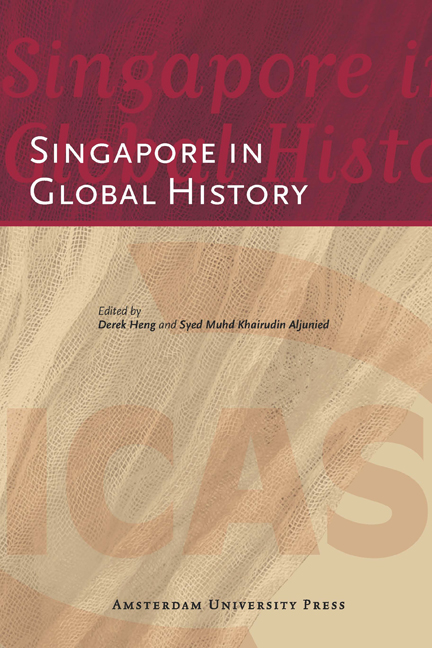Book contents
- Frontmatter
- Contents
- List of Tables and Illustrations
- Foreword
- 1 Globalising the History of Singapore
- 2 Situating Temasik within the Larger Regional Context: Maritime Asia and Malay State Formation in the Pre-Modern Era
- 3 The Singapore River/Port in a Global Context
- 4 ‘Walls of Illusion’: Information Generation in Colonial Singapore and the Reporting of the Mahdi-Rebellion in Sudan, 1887-1890
- 5 The Littoral and the Literary: Making Moral Communities in the Straits Settlements and the Gold Coast in the late Nineteenth and Early Twentieth Century
- 6 Social Discourse and Economic Functions: The Singapore Chinese in Japan’s Southward Expansion between 1914 and 1941
- 7 The Dynamics of Trans-Regional Business and National Politics: The Impact of Events in China on Fujian-Singapore Tea Trading Networks, 1920-1960
- 8 Rambutans in the Picture: Han Wai Toon and the Articulation of Space by the Overseas Chinese in Singapore
- 9 The Global Effects of an Ethnic Riot: Singapore, 1950-1954
- 10 The British Military Withdrawal from Singapore and the Anatomy of a Catalyst
- 11 Bringing the International and Transnational back in: Singapore, Decolonisation, and the Cold War
- 12 The Global and the Regional in Lee Kuan Yew’s Strategic Thought: The Early Cold War Years
- 13 A Brief History of the Hub: Navigating between ‘Global’ and ‘Asian’ in Singapore’s Knowledge Economy Discourse
- About the Contributors
- Bibliography
- Miscellaneous Endmatter
1 - Globalising the History of Singapore
Published online by Cambridge University Press: 02 February 2021
- Frontmatter
- Contents
- List of Tables and Illustrations
- Foreword
- 1 Globalising the History of Singapore
- 2 Situating Temasik within the Larger Regional Context: Maritime Asia and Malay State Formation in the Pre-Modern Era
- 3 The Singapore River/Port in a Global Context
- 4 ‘Walls of Illusion’: Information Generation in Colonial Singapore and the Reporting of the Mahdi-Rebellion in Sudan, 1887-1890
- 5 The Littoral and the Literary: Making Moral Communities in the Straits Settlements and the Gold Coast in the late Nineteenth and Early Twentieth Century
- 6 Social Discourse and Economic Functions: The Singapore Chinese in Japan’s Southward Expansion between 1914 and 1941
- 7 The Dynamics of Trans-Regional Business and National Politics: The Impact of Events in China on Fujian-Singapore Tea Trading Networks, 1920-1960
- 8 Rambutans in the Picture: Han Wai Toon and the Articulation of Space by the Overseas Chinese in Singapore
- 9 The Global Effects of an Ethnic Riot: Singapore, 1950-1954
- 10 The British Military Withdrawal from Singapore and the Anatomy of a Catalyst
- 11 Bringing the International and Transnational back in: Singapore, Decolonisation, and the Cold War
- 12 The Global and the Regional in Lee Kuan Yew’s Strategic Thought: The Early Cold War Years
- 13 A Brief History of the Hub: Navigating between ‘Global’ and ‘Asian’ in Singapore’s Knowledge Economy Discourse
- About the Contributors
- Bibliography
- Miscellaneous Endmatter
Summary
World studies, which are more commonly referred to now as global studies, have become an increasingly important field of study, both in the social sciences and humanities since the early 1970s. Beginning with discussions among economists and political scientists who sought to reconceptualise distributive and interactive dynamics between states and societies located in different parts of the world at the height of the Cold War, the boundaries of global studies have since widened as they gained the attention of geographers and sociologists in the final decades of the twentieth century. Their contribution to the institutionalisation of global studies in academia has mainly involved fresh approaches that enhance our understanding of the often unequal relationships between developed and developing countries. Keywords such as “interactive zones”, “world systems” and “free markets” have become indispensable in any discussion about the world as a whole. The justification for the need to develop new vocabularies, promulgate new generalisations and invent new methodologies lay primarily in the assumption that humankind was facing “globality” and “globalisation”, a condition and a process whereby traditional boundaries of space, knowledge and power are broken down, compressed, and intensified, by the advancement of information and transportation technology.
Where do scholars of the humanities fit into these developments? Historians in particular had a great deal to contribute to global studies, both as an academic discipline and as a subject of wider general interest after the Second World War. Historical monographs that sought to explain the evolution of human societies from earliest times up to the advent of modernity had long preceded the social sciences. Works such as William McNeill's Rise of the West (1963) and Marshall Hodgson's threevolume The Venture of Islam (1974) quickly come to mind. These two books represented a new wave of scholarship aimed at decentering the cyclical models of human development that had earlier been developed by Oswald Spengler and Arnold Toynbee. And yet the global perspectives that characterised these writings were quickly overshadowed by the pertinent concerns of the time. The dismantling of empires, the creation of new states and the outbreak of revolutions and insurgencies across the globe called for more formulaic, if not social scientific, approaches to understanding societies.
- Type
- Chapter
- Information
- Singapore in Global History , pp. 11 - 26Publisher: Amsterdam University PressPrint publication year: 2012



